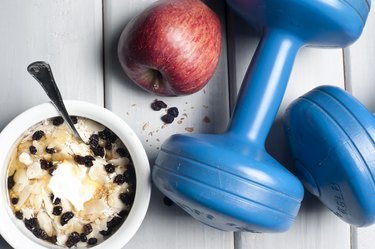
If you want to lose weight or get in shape, following a nutritious eating plan and a regular exercise program are the most effective ways to achieve your goals. Although it may be tempting to severely restrict your calories to help you lose weight faster, not eating can cause a variety of problems when you're exercising according to TeensHealth From Nemours.
Knowing the effects of not eating and then exercising can help you make healthy choices to keep your body fueled for your best performance. The effects depend on how much you're exercising and how much you eat normally. If you do not eat within an hour of a moderate workout, for instance, you will not feel any adverse effects if you eat a nutritious diet the rest of the day.
Video of the Day
Video of the Day
If you do not eat for hours before an endurance event, you will be more likely to feel fatigued and you will need to replenish carbs after 60 to 90 minutes of exercise. If you do not eat enough in general, before exercising or at other times, you will experience some long-term effects, which may include nutrient deficiencies, fatigue, muscle cramps or irregular heartbeat.
Tip
You always put fuel in the tank of your car. Without it, you can't go anywhere. Same with exercise. Fatigue or downright exhaustion could set in, ruining your workout if you don't top up your tank. Keep an array of healthy snacks on hand when eating a full meal before exercising is not an option.
Fatigue and Low Energy
Most people can eat light snacks one to two hours before exercise and meals or heavy snacks three to four hours before exercise. If you do not eat for several hours before exercise, you will be more likely to feel fatigued during your workout. If you exercise for long periods or do high-intensity workouts, you will be more likely to experience low blood sugar and fatigue if you have not eaten for several hours. Eat before exercising in the morning says the American Dietetic Association. You will improve your performance.
Your body uses carbohydrates as a main fuel source for workouts says the American Dietetic Association, and if you do not have enough carbs stored in your body from the foods you eat, your body may burn some fat. If your diet is severely restricted, however, your body will burn muscle tissue and even organ tissue to create energy, which can cause you to lose muscle mass, feel fatigued and develop long-term health problems.
Read more: When You Are Too Tired to Work Out
Don't Put Yourself at Risk
If you do not eat enough before exercising and do not replenish the carbs, fat and protein your body has used up during workouts, you are putting yourself at risk for nutritional deficiencies such as anemia. Anemia or low iron commonly causes fatigue and will make you feel weak during workouts.
If you do not eat enough over an extended period of time — such as months or years — your body may go into starvation mode, burning body tissues for energy and holding onto any calories you consume to keep your basic systems running. Starvation mode makes it hard to lose weight and poses serious health risks such as bone loss, irregular heart rhythms and even heart attacks.
Read more: Why You're So Tired After a Workout
Boost Your Energy Levels
Keep your energy levels up and your body working smoothly during workouts by eating a nutritious diet with frequent snacks and four small meals throughout the day. Active people need plenty of carbohydrates, protein and healthy fats — unsaturated fat — for energy to perform well and stay healthy. The American Council on Exercise advises healthy adults to eat between 45 to 65 percent of daily calories from carbs, 20 to 35 percent from fat and 10 to 35 percent from protein.